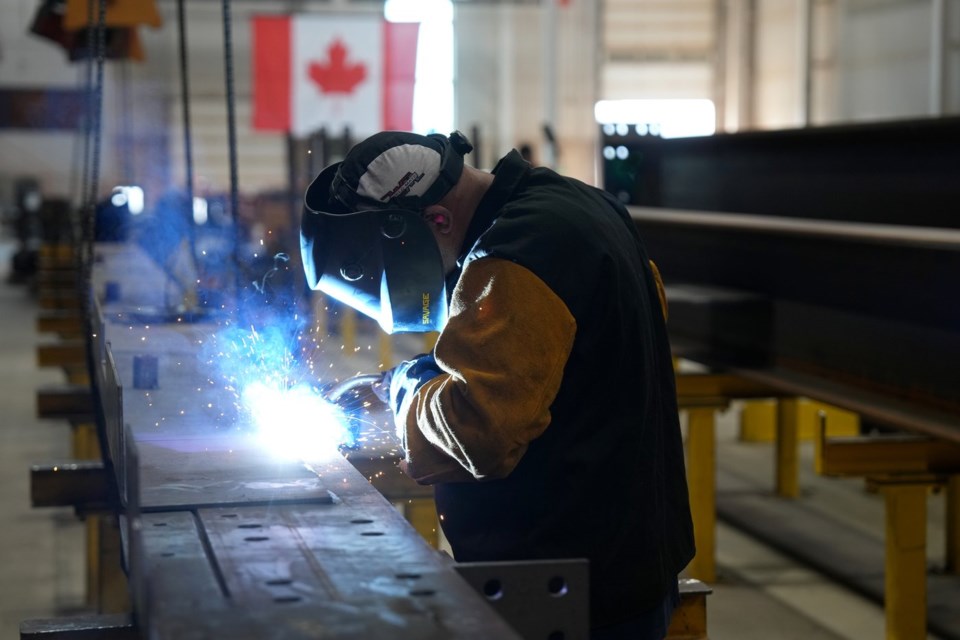TORONTO — There's growing concern about a move by the United States to make hundreds more product categories subject to the country's 50 per cent tariffs on steel and aluminum content.
The addition of 407 categories of products, ranging from bulldozers to furniture to wind turbines, came into effect earlier this week to add pressure and costs to those hoping to sell into the U.S. market.
"This action is another blow to the integrated economy our two countries have built over the last several decades," Catherine Cobden, head of the Canadian Steel Producers Association, said in a statement Thursday.
She said the industry is dismayed by the move, which will also affect products like cutlery, propane tanks, air conditioners and agricultural equipment like tractors.
The change is significant because many of the products hadn't yet been hit with tariffs because they fall under the Canada-U.S.-Mexico free trade deal, said Dennis Darby, head of Canadian Manufacturers and Exporters.
"These are things that, up until a week ago, were exempt under CUSMA," said Darby.
"It's regrettable, and it just puts more pressure on Canada."
The U.S. Department of Commerce said Tuesday that adding to the range of products subject to metal tariffs shuts down avenues for circumvention and supports revitalizing U.S. steel and aluminum industries.
The release from the department came a day after the higher rates came into effect Monday, having only given notice they were coming Friday afternoon.
"That is not a normal amount of time," said Joy Nott, a partner in trade and customs at KPMG in Canada.
The quick turnaround means many companies are still working to catch up, she said.
"A lot of people are still digging through and I think trying to figure out exactly what it does mean?"
The product range, from consumer goods like hairspray and baby bassinets, to industrial goods like railcars, is a big step up for the metal tariffs that had previously only applied to products fully made of metal.
The breadth and depth of products now covered by tariffs is coming as a surprise to some companies she's spoken with, said Nott.
She said the steep rates for products that now fall under the tariff categories means it's especially important for companies to check the classification codes they're using, something that was much less critical when goods flowed freely.
The metal tariffs had already made Canadian steel exports to the U.S. a money-losing proposition, while this latest action threatens to cut into what are already thin margins for manufacturers who use steel and aluminum in Canada.
"Canada's margins for manufactured goods, especially a lot of these things which are either intermediate or industrial goods aren't that high," said Darby.
The metal content contained in the products make up a substantial portion of their value, meaning a tariff just on the metal value can still make for a significant burden, he said.
The move also adds to pressure for the federal government to get a trade deal in place, and prepare for the tough negotiations ahead on a renewed North American trade deal, said Darby.
"The U.S. administration, especially by doing this, by continuing to put this kind of pressure on, some industry-specific and product-specific, is going to put a lot more pressure on that negotiation."
On Wednesday, Hamilton Mayor Andrea Horwath said the latest tariffs could have a catastrophic impact on the city, which has substantial steel operations.
“Trump’s latest underhanded move to quietly expand U.S. tariffs to more than 400 steel and aluminum product categories is devastating news for Hamilton."
She said she's reached out to both the provincial and federal governments to push them to act.
Cobden said Canada should retaliate on the latest tariff increase with a 50 per cent levy on all U.S. steel entering Canada, including ending an "ill-advised" April reprieve on U.S. steel used in manufacturing and processing.
Global Affairs Canada did not provide a comment.
This report by The Canadian Press was first published Aug. 21, 2025.
Ian Bickis, The Canadian Press




